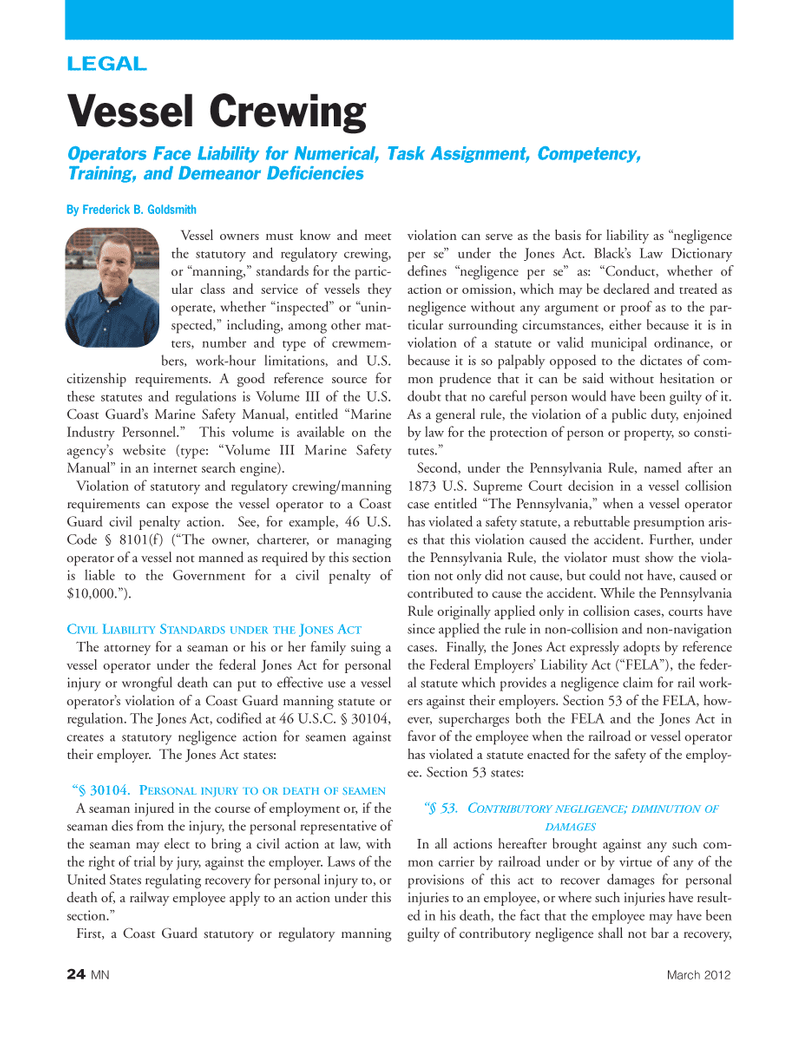
Page 24: of Marine News Magazine (March 2012)
Training & Education
Read this page in Pdf, Flash or Html5 edition of March 2012 Marine News Magazine
24MNMarch 2012 Vessel owners must know and meet the statutory and regulatory crewing, or ?manning,? standards for the partic- ular class and service of vessels they operate, whether ?inspected? or ?unin- spected,? including, among other mat-ters, number and type of crewmem- bers, work-hour limitations, and U.S. citizenship requirements. A good reference source for these statutes and regulations is Volume III of the U.S. Coast Guard?s Marine Safety Manual, entitled ?Marine Industry Personnel.? This volume is available on the agency?s website (type: ?Volume III Marine Safety Manual? in an internet search engine). Violation of statutory and regulatory crewing/manning requirements can expose the vessel operator to a Coast Guard civil penalty action. See, for example, 46 U.S. Code § 8101(f) (?The owner, charterer, or managing operator of a vessel not manned as required by this section is liable to the Government for a civil penalty of $10,000.?).CIVILLIABILITY STANDARDSUNDERTHE JONESACTThe attorney for a seaman or his or her family suing avessel operator under the federal Jones Act for personal injury or wrongful death can put to effective use a vessel operator?s violation of a Coast Guard manning statute or regulation. The Jones Act, codified at 46 U.S.C. § 30104, creates a statutory negligence action for seamen against their employer. The Jones Act states: ?§ 30104. PERSONALINJURYTOORDEATHOFSEAMEN A seaman injured in the course of employment or, if the seaman dies from the injury, the personal representative of the seaman may elect to bring a civil action at law, with the right of trial by jury, against the employer. Laws of the United States regulating recovery for personal injury to, or death of, a railway employee apply to an action under this section.?First, a Coast Guard statutory or regulatory manning violation can serve as the basis for liability as ?negligence per se? under the Jones Act. Black?s Law Dictionary defines ?negligence per se? as: ?Conduct, whether of action or omission, which may be declared and treated as negligence without any argument or proof as to the par- ticular surrounding circumstances, either because it is in violation of a statute or valid municipal ordinance, or because it is so palpably opposed to the dictates of com-mon prudence that it can be said without hesitation or doubt that no careful person would have been guilty of it. As a general rule, the violation of a public duty, enjoined by law for the protection of person or property, so consti- tutes.?Second, under the Pennsylvania Rule, named after an 1873 U.S. Supreme Court decision in a vessel collision case entitled ?The Pennsylvania,? when a vessel operator has violated a safety statute, a rebuttable presumption aris- es that this violation caused the accident. Further, under the Pennsylvania Rule, the violator must show the viola- tion not only did not cause, but could not have, caused or contributed to cause the accident. While the Pennsylvania Rule originally applied only in collision cases, courts have since applied the rule in non-collision and non-navigation cases. Finally, the Jones Act expressly adopts by reference the Federal Employers? Liability Act (?FELA?), the feder- al statute which provides a negligence claim for rail work- ers against their employers. Section 53 of the FELA, how- ever, supercharges both the FELA and the Jones Act in favor of the employee when the railroad or vessel operator has violated a statute enacted for the safety of the employ- ee. Section 53 states: ?§ 53. CONTRIBUTORYNEGLIGENCE ; DIMINUTIONOF DAMAGES In all actions hereafter brought against any such com- mon carrier by railroad under or by virtue of any of the provisions of this act to recover damages for personal injuries to an employee, or where such injuries have result- ed in his death, the fact that the employee may have been guilty of contributory negligence shall not bar a recovery, LEGALBy Frederick B. Goldsmith Vessel Crewing Operators Face Liability for Numerical, Task Assignment, Competency, Training, and Demeanor DeficienciesMN#3 (18-31):MN 2011 Layouts 3/2/2012 9:30 AM Page 24

 23
23

 25
25
